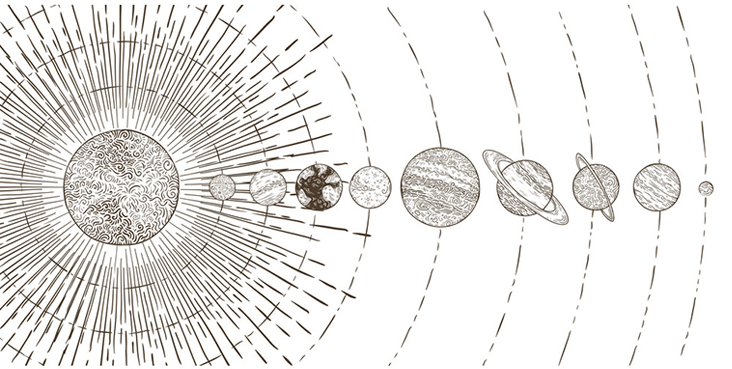Birth Chart Calculator
Free Birth Astrological Chart (Natal Chart) by astrologer Marta Winter .


Birth Chart (natal chart) is a representation of the celestial sky at the moment of a person's birth. It depicts the positions of stars and planets exactly at the place and time of your birth. The term "natal" itself comes from the Latin word natalis, which means "birth". It was believed that this is how the newborn should perceive the sky, just entering this world.
Each person's Birth Chart is unique, like a set of genes or fingerprints. With its help, we can discover ourselves, our character, potential, abilities, and talents bestowed upon us by destiny. The Birth Chart can guide us in finding our path in life, choosing the right direction, and overcoming obstacles along the way.
And, of course, it not only helps us understand the present but also provides insights into the future.
Advantages of Our Online Birth Chart
- Our online birth chart is the result of the work of a team of professional astrologers led by the project author, astrologer Marta Winter.
- This service offers a new format of online birth chart. Its advantage lies in its convenience and intuitive interface. We have divided the birth chart into sections, provided hints and comments, created a graphical menu, and made it as easy as possible to find any information you are interested in.
- By entering your data, you will receive a systematic, visual, and detailed interpretation of your birth horoscope from professional astrologers.
- Access to ALL sections of the birth chart is completely free, without subscription or registration.
If you are using a birth chart for the first time or if you have any questions about how to use it, take a look at this article.
Article Contents:
- Questions answered by the birth chart
- Components of the birth chart and what they mean
- Key points in your birth chart. Where to start
Key Questions Answered by the Birth Chart:
- The birth chart reveals your image and how others perceive you.
- It provides detailed information about your character, inclinations, abilities, and talents - including those that are still hidden or unrealized. It advises on which abilities you should manifest.
- It describes the traits of your character in various areas - your emotional sphere, communication, love, work, etc.
- Your birth horoscope describes your potential - the energy reserves you possess and the areas where you can direct your energy to achieve the best results. It indicates the heights you can reach.
- It helps you understand yourself, your path, and your life purpose. Like a navigator, it shows the right direction and charts the optimal route to bypass obstacles on your life path.
Components of the Birth Chart
Below, we will discuss the components and sections of the birth chart, as well as their roles in your birth horoscope. In brief, these roles are as follows:
Planets in Zodiac Signs - reveal your personality traits and character.
Planets in Houses - indicate different areas of your life, such as love, work, money, and property.
Ascendant - describes your image and how others perceive you.
Aspects - are "strokes to the portrait" that provide additional information about your character and behavior in certain situations.
Now, let's discuss these sections and their influence on your birth horoscope in more detail.
Planets in Zodiac Signs
In astrology, the planets include the Sun, Moon, Venus, Mars, Jupiter, Saturn, Uranus, Neptune, and Pluto.
Each planet has a different level of influence. The Sun is considered the strongest planet, followed by the Moon and so on, in descending order from the powerful Sun to the farthest planet, Pluto, which has the least impact on our lives.
At the moment of your birth, each planet was in a specific Zodiac sign. In our online birth chart, in the section "Planets in Zodiac Signs," you can see the positions of all the planets at the time of your birth and learn what it means for you.
The presence of each planet in a specific Zodiac sign in your birth chart is the key to a complete description of your character and personality.
Here's what the planets in Zodiac signs can tell about you:
- Sun - its placement in a Zodiac sign reveals your character, abilities, and inner self. When someone asks you, "What's your Zodiac sign?" and you answer, for example, "Aries" or "Pisces," it means that the Sun was in the sign of Aries or Pisces at the time of your birth.
- Moon in a Zodiac sign - governs your emotions, intuition, and subconscious. The Moon reveals your sensitivity and empathic abilities, the capacity to empathize and feel others.
- Mercury - indicates your logical thinking ability, resourcefulness, communication skills, and social interactions. Mercury represents your communicativeness, adaptability, and sound judgment.
- Venus - represents your affections, feelings of love, tenderness, the sense of harmony, and attraction to beauty. Venus also influences your relationships with close ones - relatives, friends, and romantic partners.
- Mars in a Zodiac sign - influences your energy level, how you utilize it, and your approach to assertiveness, activity, aggression, masculine energy, and sexual desires.
- Jupiter - governs your broad-mindedness, worldview, the desire to expand your comfort zone and prosperity in life. Jupiter represents your benevolence, optimism, and authority.
- Saturn - describes your organization skills, discipline, and ability to collaborate with others.
- Uranus - reflects your aspiration for freedom and independence. Uranus is associated with individualism, stubbornness, originality, and a tendency to challenge traditions.
- Neptune - represents the spiritual side of your nature. It reveals your ideals, fantasies, dreams, premonitions, intuition, and psychic abilities.
- Pluto - spends over 20 years in each Zodiac sign, which means its influence extends to an entire generation. Pluto embodies the unknown, hidden, and transformative processes on Earth. It signifies global trends and developmental directions.
Houses in Zodiac Signs
If you look at the circle of the birth chart, you'll notice that it's divided into 12 sections, each representing an astrological house.
Each house symbolizes one of the twelve areas of our lives:
- 1st House - represents a person's individuality, character, and habits;
- 2nd House - relates to money, financial outlook, and attitude towards wealth;
- 3rd House - governs communication, friendships, and relationships with acquaintances;
- 4th House - represents home, real estate, and domestic affairs;
- 5th House - signifies love, interests, hobbies, relationships with children;
- 6th House - relates to work, labor, relationships in the workplace, and health;
- 7th House - represents marriage, romantic relationships, and business partnerships;
- 8th House - signifies spirituality and religion;
- 9th House - relates to philosophy, worldview, higher education;
- 10th House - represents career, achievements, social status;
- 11th House - signifies friends, close circle of acquaintances, and future plans;
- 12th House - relates to subconsciousness, intuition, and hidden motives.
In the houses of your natal chart, there are planets: some houses may not have any planets, while others may have 1, 2, or more. The planets in the houses can provide insights into various areas of your life, such as work, career, and love.
Click on any house in your natal chart, and you will receive a detailed explanation of which planets were in that house at the time of your birth and what it means.
Ascendant
The Ascendant is the Zodiac sign that was rising above the horizon at the moment of your birth. It marks the beginning point of your horoscope and holds significant importance. When studying the natal chart, the Ascendant is usually one of the first elements to be examined.
The Ascendant influences how a person wants to appear, how they present themselves, how they behave, and how they appear in society. Essentially, it describes a person's image or "social mask."
Elements
The elements in the natal chart correspond to your temperament. The balance of the four elements creates a unique pattern of your emotions.
Fire, Earth, Water, and Air: the balance of these four elements in your birth chart sets the emotional background for the depiction of your character. How much of a sanguine, melancholic, phlegmatic, or choleric temperament is within you? This is reflected in the Elements Chart, and the explanations below it will help you understand what it means specifically for you.
Ancient astrologers began interpreting natal charts by analyzing the elements because they believed that the elements are the foundation and basis of the birth chart.
Aspects
An aspect refers to the mutual arrangement of two planets in your natal chart, which influences your horoscope. For example, if the Sun was in close proximity to Venus at the time of your birth, it is called a "conjunction," which affects your character and adds certain traits.
Aspects add individuality and additional details to the natal chart, helping to understand the nuances of planetary influences on your destiny and character.
In your online birth chart, you can see the following aspects:
- Conjunctions - the strongest aspects that have a significant influence on your birth chart;
- Harmonious aspects (trine, sextile) - their influence is favorable and facilitates your life;
- Tense aspects (opposition, square) - they bring difficulties and obstacles to your birth chart.
The Key Elements in Your Birth Chart. Where to Begin
Since there is a lot of text in an online birth chart, the question often arises: where do I start studying my birth horoscope? How do I identify the most important and essential aspects that I cannot do without? In what order should I read my horoscope?
There is a simple algorithm to follow that will prevent you from getting confused or overwhelmed with unnecessary information.
Step 1:
The foundation of the birth chart is your personality, your "self." Therefore, start with the most important aspects by first studying the following sections:
- Elements (your temperament);
- Ascendant (your image, how others perceive you);
- Sun in the Zodiac sign (your character, worldview, talents, and abilities);
- 1st House (your identity, inner self).
Step 2:
In the "Planets in Houses" section, find out which are your major houses, the main spheres of life, and read about them. The major houses will be:
- The house where your Sun is located;
- Houses where you have two or more planets;
- The house where your Moon is located;
- The houses whose life areas you consider most important for yourself.
The rest of the information in the birth chart will be additional, and you can study it gradually and in any order.


Your astrologer Marta Winter. Birth chart calculator - a free special project of the website 1001horoscopes.com.































































































































